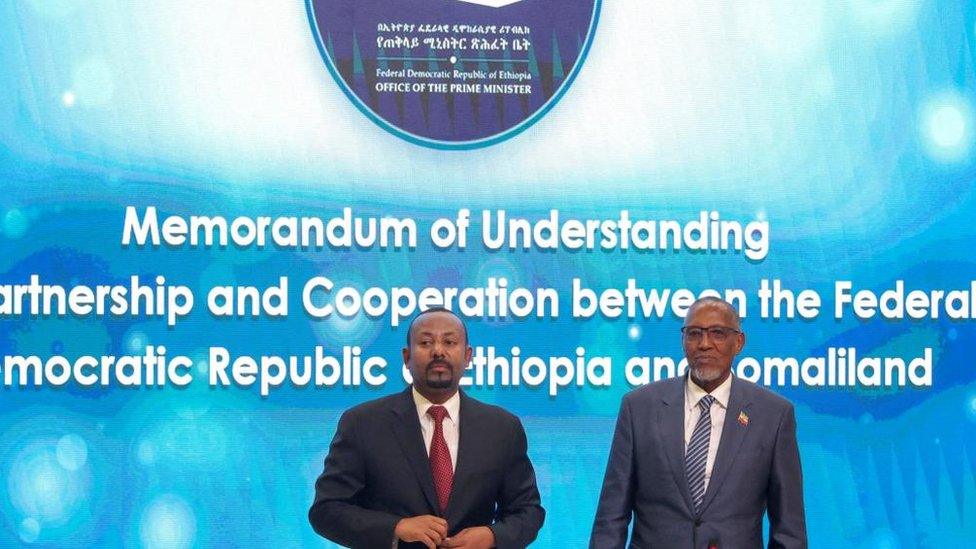Ethiopia's PM Abiy Ahmed says his country does not wish harm on Somalia
- Published

Ethiopia's Prime Minister Abiy Ahmed (L) signed a deal with Somaliland's President Muse Bihi Abdi on 1 January
Ethiopia's Prime Minister Abiy Ahmed has said that his country "does not wish any harm" on neighbouring Somalia.
His comments in parliament came after Somalia accused landlocked Ethiopia of trying to annex part of its territory to gain access to the sea.
Last month, Ethiopia struck a controversial deal with the breakaway republic of Somaliland.
Somaliland, which Somalia sees as part of its territory, agreed to lease a stretch of coastline to Ethiopia.
Somalia described the agreement as an act of aggression and President Hassan Sheikh Mohamud called on youths "to prepare for the defence of our country".
He also said that he would only talk to Ethiopia if the deal was withdrawn.
Protests against the deal have also been held in Somalia's capital, Mogadishu, with tens of thousands of people turning up to express their opposition.
Meanwhile, diplomats have tried to calm tensions and said that Somalia's sovereignty over all its territory needs to be recognised.
In an apparent move to dampen concerns, Mr Abiy painted a picture to MPs on Monday of brotherhood, external among the neighbours, despite a devastating war between the two countries in the 1970s.
"The people of Ethiopia and Somalia are bound by blood. Many Ethiopians have died for the peace of Somalia," he said, seemingly referring to the Ethiopian forces that have backed Somalia's government in its fight with armed Islamist group al-Shabab.
"Therefore, the friendship between the two countries is profound," Mr Abiy added.
He went on to blame "some forces [for] trying to incite conflict between the two nations". But he also continued to talk about access to the sea arguing that it would benefit the whole region.
Mr Abiy had previously described sea access as an "existential issue" for his country.
On 1 January, he signed a memorandum of understanding (MoU) with Somaliland President Muse Bihi Abdi.
An MoU is a statement of intent rather than a legally binding agreement.
As part of the deal, Somaliland said it was ready to grant Ethiopia access to the sea for commercial traffic through a port. It also said it could lease a section of the coast to Ethiopia's navy.
In return, Somaliland said that Ethiopia would recognise its independence, but this has not been confirmed by Addis Ababa.
Somaliland, a former British protectorate, declared itself independent from Somalia in 1991 and has all the trappings of a country, including a working political system, regular elections, a police force and its own currency.
But its independence has not been recognised by any country.